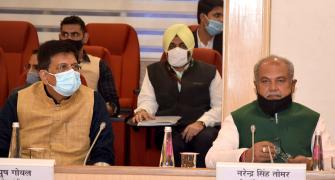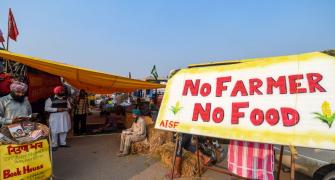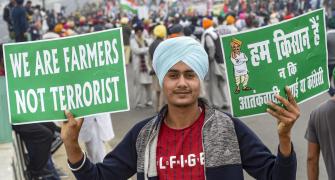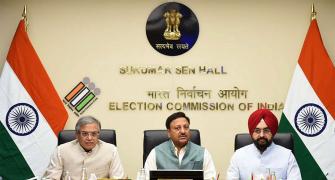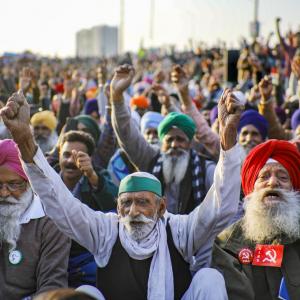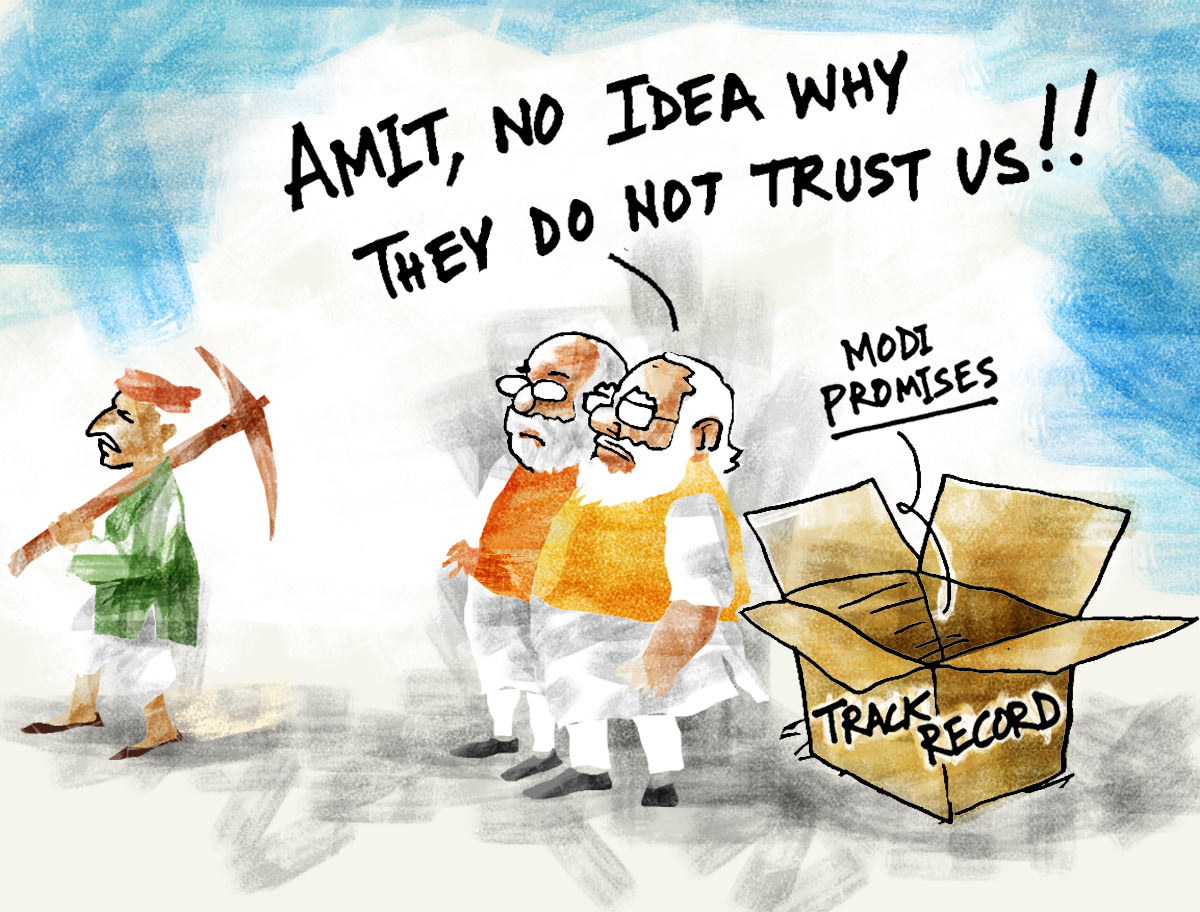Regardless of how the stalemate ends, the government needs to learn that regardless of its parliamentary strength it cannot take people for granted.
>A little bit of humility would do it a lot of good, recommends Virendra Kapoor.

2020 began with one set of protesters occupying a main artery of the national capital.
That was the Muslim-dominated anti-Citizenship (Amendment) Act.
It received the loud and demonstrable support of the usual civil society do-gooders, scores of media hacks and, predictably, the Opposition parties.
After weeks of hogging the front pages, the protest ended in a whimper.
After the Delhi assembly poll, the onset of the once-a-century pandemic forced the Shaheen Bagh protesters to pull down the shutters.
If it succeeded in achieving anything, we are in the dark.
Now, cut to the beginning of 2021.
The more than a month old protest by Punjab farmers is still in full flow.
No sign of the farmers' unions -- at last count there were forty of them -- tiring of sitting it out in the biting cold with night temperatures often closer to the freezing point.
The Punjab peasantry is a hardy lot.
Besides, aware that the ruling party would not want to alienate the farmers, easily the single largest bloc of voters in the country, it has dug in its heels.
Its all-or-nothing stance would normally leave it stranded, with no effort by the government to try and thrash out a compromise.
But given its immense electoral clout the government feels obliged to keep it in good humour.
Hence, the multiple rounds of negotiations to locate a compromise.
But whether it was the CAA or the three agrarian reforms, the protests would most likely have been muted had Parliament been allowed to hear dissenting voices.
The government ill-served its own cause steamrolling the Bills without heeding the advice to send them to the select committees for a threadbare examination.
The arrogance of numbers in the Lok Sabha led the government to un-heed the Opposition.
Admittedly, the farm sector reforms had the support of the Congress, the NCP, the AAP and other parties.
Their election manifestoes prove it beyond an iota of doubt.
But given the unhealthy tradition of the Opposition vehemently opposing what it had proposed with great enthusiasm while in power, the government failed to anticipate the blowback from entrenched vested interests.
Now it is paying for its arrogance.
Of course, nobody in his right mind would question Modi's motivation to reform the agri sector.
As a votary of reform and modernisation, his intention cannot be questioned.
But where he often errs is in being impatient for change, trying to force it down the gullet of unwilling and unready stakeholders.
Democrats everywhere are prone to get frustrated with the slow pace of forward movement, of resistance to positive change, nay progress.
But thrusting reforms on an unwilling people is always fraught with counter mobilisation, particularly by those who fear their economic interests might be affected.
In this case, all sort of fear-rumouring such as that they will forfeit their lands and livelihoods to 'Ambani and Adani' has furthered fuelled the anti-reform anger.
To tell the truth, the CAA was a deliberate, well-considered, strategy to target Muslims and to try and polarise society.
For, when it comes to granting citizenship to victims of persecution in Muslim-majority neighbouring countries it is natural for the bureaucracy to prioritise the case of Hindus, Sikhs, Jains and Buddhists, etc.
You did not need to specifically exclude Muslims to achieve what was already a de facto position.
By pointedly barring Muslims, the government was addressing its own core Hindutva base.
But thus it opened itself to the charge of distorting the founding principle of the Republic by injecting religion as a determinant of state policy.
However, the case of farm laws stemmed from a genuine desire to open up the farm sector to organised finance, to modern technologies of production, preservation and marketing of farm produce on a nation-wide scale.
That Indian agriculture is at least half a century behind and needs to shift at least half of the fifty percent working population to manufacturing and service sector jobs is recognised even by those who are railing the reforms.
The need for agrarian reforms is better understood if you realise that the share of agriculture in the gross domestic product is only fifteen percent.
The trouble is that the government failed to prepare those who had developed a vested interest in the current system of obligatory minimum support price system.
Not many would recall that the MSP was actually meant to be a floor price, but it is now the price at which wheat and paddy in Punjab and Haryana -- 86 percent of it -- is compulsorily procured by the FCI, a good part of it for rotting or for being eaten by rodents.
Because the government failed to get the farmers' unions on board before enacting the laws, it is now under pressure to repeal them outright.
Otherwise, after its concession to adjudicate disputes not as originally provided in the law through a junior magistrate, in a judicial forum, and its climbdown on criminalising burning of farm waste, and its readiness to abandon reform of the state electricity boards through direct subsidy payments to farmers, are all signs of its willingness to go the extra mile in search of a compromise.
But there are limits to how much a government with a solid majority can bend.
Regardless of how the stalemate ends, the government needs to learn that regardless of its parliamentary strength it cannot take people for granted.
A little bit of humility would do it a lot of good.
However strong a ruler, his cause is better served by demonstratively carrying the people along.
An impression of strong-arming the affected constituents, even for the sake of their own welfare, can prove counter-productive.
Governments in democratic countries have the onerous task of keeping the people on their side all through their time in office, and not just on the day of the polling.
A sense of humility, not arbitrariness and arrogance can achieve what ordinarily cannot be thrust down on an unwilling people in a noisy and always fractious democracy.
Feature Presentation: Aslam Hunani/Rediff.com

